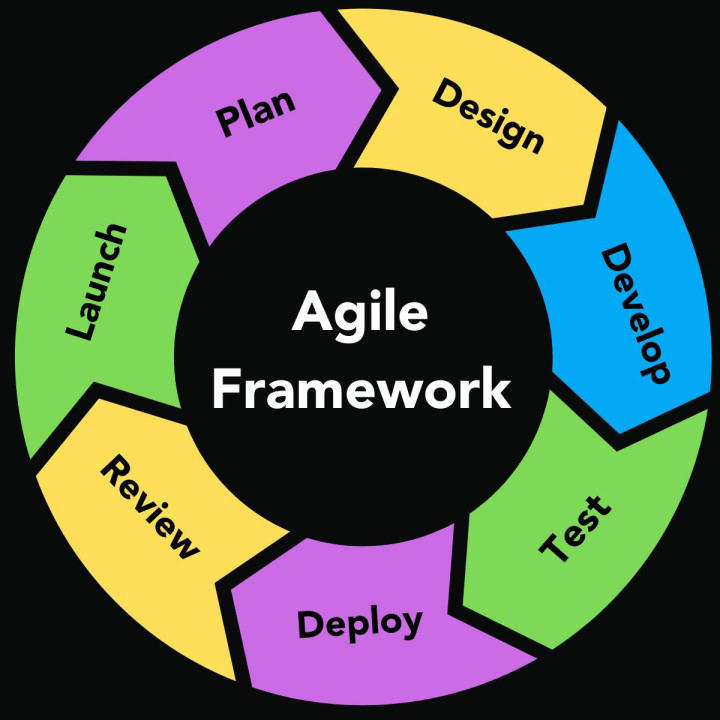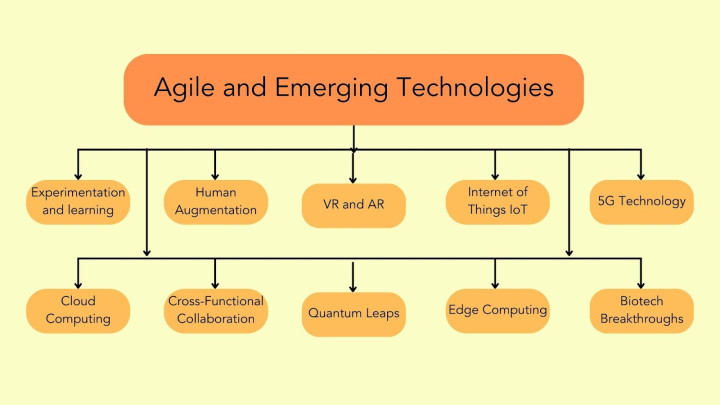What does the future hold for Iterative Agile?
In the journey through the frontiers of innovation, Agile methodologies serve as a compass, guiding software development and other teams through uncharted territories with agility, resilience, and a relentless focus on delivering value. As emerging technologies continue to reshape the world around us, Agile remains a beacon of innovation, empowering organisations to navigate the complexities of the digital age and unlock the full potential of tomorrow's technologies, today.
The future of Agile appears promising, with continued evolution and adoption across industries. As technology advances and market demands shift, Agile methodologies are likely to adapt to accommodate emerging trends such as remote work, artificial intelligence, and decentralised teams.
In the coming years, Agile methodologies are expected to undergo further refinement and specialisation to meet the evolving needs of businesses.

1.Customer-Centricity
The focus on delivering value to customers will remain a driving force behind Agile methodologies. As customer expectations evolve, Agile teams will need to prioritise customer feedback, iterate rapidly, and deliver high-quality products that meet changing demands.
Agile methodologies might evolve to include more direct interaction with end-users, leveraging real-time feedback and participatory design techniques to ensure that products and services are closely aligned with customer needs and expectations.
2.DevOps
One key trend is the integration of Agile with DevOps practices, fostering a more seamless and automated software development lifecycle from code creation to deployment. This integration will likely lead to the adoption of tools and platforms that facilitate continuous integration, delivery, and monitoring, allowing teams to rapidly respond to customer feedback and market changes.
3.Remote working
The rise of remote work and distributed teams, accelerated by technological advancements and global events, will shape the future of Agile. Agile practices will need to adapt to effectively manage collaboration and communication across geographically dispersed teams, potentially leading to the development of new frameworks and tools specifically designed for remote Agile workflows.
As remote work becomes more common, the use of digital tools that support Agile practices (like virtual boards, collaboration platforms, and project management software) is expected to grow. These tools make it easier for distributed teams to maintain the communication and collaboration essential for Agile.
4.Hybrid
Agile methodologies will likely continue to evolve to accommodate the increasing complexity of projects and the growing diversity of team structures. This may involve the development of hybrid Agile frameworks that combine elements of different methodologies to suit specific project requirements.
5.Globalisation and Cultural Diversity
As businesses operate on a global scale and teams become more culturally diverse, Agile methodologies will need to account for different working styles, time zones, and cultural norms. Cultural sensitivity and inclusivity will play a significant role in shaping Agile practices to foster effective collaboration and communication across diverse teams. This shift could lead to more democratic workplace environments where ideas can come from any level of the business.
There's a growing trend in scaling Agile beyond individual teams to entire organisations. Frameworks like SAFe (Scaled Agile Framework) and LeSS (Large-Scale Scrum) are gaining popularity as companies look to apply Agile principles across larger, more complex projects and multiple teams.
6.Global Standardisation and Certification
As Agile practices become more widespread, there could be a move towards global standardisation of Agile methodologies and certification processes. This could help ensure a consistent understanding and implementation of Agile practices across different regions and industries.
With the growing adoption of Agile, there will likely be an increase in Agile-related education, training, and certification programs. This education will not only be targeted at project managers but also at other roles within organisations to embed Agile practices company-wide.
7.Personal Agility
There is a growing emphasis on personal agility – the idea that individuals can apply Agile principles to their personal development and life management. This trend could lead to more resources and training programs aimed at helping individuals become more adaptable, proactive, and resilient in their personal and professional lives.
8.Continuous Learning and Skill Development
As technology evolves rapidly, Agile methodologies will emphasise continuous learning and skill development among team members. This may involve promoting a culture of experimentation, providing opportunities for professional development, and fostering knowledge sharing within Agile communities.
9.Evolution of Agile Leadership
The role of leadership in Agile environments is likely to evolve further, emphasising servant leadership, where the focus is on empowering and enabling teams rather than directing them. Leaders in Agile contexts will continue to develop skills in facilitation, coaching, and enabling cross-functional collaboration.
10.Business Agility
Agile methodologies will continue to extend beyond software development to other areas of business, including marketing, HR, finance, and beyond. The emphasis on agility and responsiveness will drive businesses to adopt Agile principles across various functions to remain competitive and adaptable in a rapidly changing business landscape. This trend is expected to continue as more industries seek to improve efficiency, responsiveness, and customer satisfaction.

11.Collaborative Ecosystems
Agile methodologies will increasingly involve collaboration beyond traditional team boundaries, including partnerships with third-party vendors, open-source communities, and other stakeholders. Agile frameworks will need to facilitate seamless collaboration and integration with external contributors to accelerate innovation and value delivery.
12.Regulatory Compliance and Security
Compliance requirements and security concerns will shape how Agile methodologies are implemented, particularly in industries such as healthcare, finance, and government. Agile practices will need to incorporate robust security measures and compliance frameworks to ensure the integrity and privacy of sensitive data.
There will be adaptations to ensure that Agile practices can coexist with the need for compliance and rigorous documentation. This could lead to new frameworks that combine the flexibility of Agile with the rigor of traditional compliance processes.
13.Ethical and Sustainable Practices
With growing awareness of environmental and social issues, Agile methodologies will increasingly incorporate principles of sustainability and ethical considerations into their practices. This may include reducing waste and energy consumption, promoting diversity and inclusion, and prioritising ethical sourcing and production practices.
14.Data-Driven Decision Making
With the rise of big data, analytics will become increasingly important in guiding Agile practices. Agile teams will rely more on data analytics and metrics to inform decision-making processes. Utilising insights from data will enable teams to identify areas for improvement, measure the impact of their work, and make informed adjustments to their strategies and priorities.
Predictive analytics, machine learning, and data-driven decision-making could help Agile teams anticipate market trends, customer needs, and project challenges more effectively.
15.Resilience and Crisis Management
Agile methodologies will evolve to better address resilience and crisis management in response to unexpected events such as pandemics, natural disasters, or economic downturns. Agile frameworks will incorporate strategies for maintaining continuity of operations, managing risk, and adapting quickly to disruptions.
16.Decentralised Finance and Blockchain
In industries such as finance and banking, the rise of decentralised finance (DeFi) and blockchain technology will influence how Agile methodologies are applied. Agile teams may need to adapt their practices to accommodate the unique challenges and opportunities presented by decentralised systems and blockchain-based applications.
With its decentralised nature, blockchain could introduce new ways of managing Agile project documentation, contracts, and transparently tracking project progress and changes. It could also offer new areas for Agile development, such as decentralised applications (dApps).
17.Healthcare Innovation and Telemedicine
The healthcare industry's increasing adoption of Agile methodologies will drive innovation in telemedicine, digital health solutions, and patient-centred care. Agile frameworks will be tailored to meet the specific needs of healthcare organisations, emphasising compliance, patient privacy, and regulatory requirements.
The healthcare industry, challenged by rapid changes, complex regulations, and the urgent need for innovation, may see a broader application of Agile. This could lead to faster development of medical devices, patient-centred care models, and streamlined processes for delivering services.
The Agile community is becoming increasingly aware of the importance of mental health and well-being. Future Agile practices may incorporate elements designed to prevent burnout, promote work-life balance, and support the emotional and psychological well-being of team members.
18.Financial Agility
In the financial sector, Agile can lead to the rapid development and deployment of financial products, responsive customer service models, and adaptive risk management strategies. As fintech continues to grow, the Agile development process could become standard practice in both start-up's and established financial institutions.
19.Agile in Education
As the world embraces lifelong learning and adaptive skill sets, educational institutions from K-12 to higher education may adopt Agile principles. This could revolutionise teaching methodologies, making them more collaborative, iterative, and focused on real-world problem-solving and continuous feedback.
20.Public Sector Adoption
While Agile has traditionally been associated with private sector and technology projects, there is increasing interest from public sector organisations. Government entities and non-profits are beginning to apply Agile methodologies to improve efficiency, transparency, and responsiveness to public needs.
21.Artificial Intelligence and Automation
Agile methodologies will leverage advances in artificial intelligence and automation to streamline development processes, improve testing efficiency, and enhance product quality. Agile teams will incorporate AI-driven tools and algorithms into their workflows to automate repetitive tasks and augment human capabilities.
22.Cybersecurity and Privacy
With the growing threat of cyber-attacks and data breaches, Iterative Agile methodologies will place greater emphasis on cybersecurity and privacy considerations. Agile teams will integrate security practices into every stage of the development lifecycle, from design to deployment, to mitigate risks and protect sensitive information.
23.Digital Twins
A digital twin is a virtual replica of a physical system, process, or product. Agile teams can use digital twins to simulate how a product operates within a given environment, allowing for rapid prototyping, testing, and iteration in a virtual space before physical deployment.
These emerging trends and factors will shape the future evolution of Agile methodologies and the Agile development process , driving innovation, adaptation, and continuous improvement in how teams collaborate, innovate, and deliver value in a rapidly changing world.
The evolution of Agile is set to continue influencing not just how teams work, but also how organisations shape their business models and strategic objectives.
Overall, the future of Agile will be shaped by a combination of technological advancements, changing work dynamics, evolving customer expectations, and the need for business agility in an increasingly competitive and interconnected world. Agile methodologies will continue to evolve and adapt to meet these challenges, driving continuous improvement and innovation in how teams collaborate and deliver value.
Agile and Emerging Technologies
At its core, Agile is founded on principles of flexibility, collaboration, and customer-centricity. Unlike traditional rigid waterfall methods, Agile promotes iterative development, allowing teams to respond rapidly to evolving requirements and market dynamics. This adaptive approach aligns perfectly with the fast-paced nature of emerging technologies, where rapid experimentation and continuous learning are essential for success.
One of the hallmarks of emerging technologies is uncertainty. Whether it's the rapidly evolving landscape of artificial intelligence or the regulatory uncertainties surrounding blockchain and DeFi, companies working with emerging technologies must be prepared to navigate a high degree of risk and uncertainty. Iterative Agile methodologies provide a framework for managing this uncertainty by embracing change, adapting quickly to new information, and continuously reassessing priorities and strategies.

1.Iterative Experimentation and Learning
One of the key strengths of Agile development model is its emphasis on iterative experimentation and learning. This approach is particularly well-suited to emerging technologies, where the landscape is constantly evolving, and the potential for innovation is virtually limitless. By breaking projects into small, manageable increments, (iterations), Agile teams can experiment with new technologies, gather feedback, and iterate quickly based on the results.
2.Human Augmentation
The field of human augmentation, which includes technologies like biohacking and wearable technology, presents a new frontier for Agile development. These technologies blend the physical and digital worlds, requiring Agile teams to continuously adapt and innovate.
3.Virtual and Augmented Reality (VR/AR)
The development of VR and AR applications presents new challenges and opportunities for Agile teams, including the need for rapid prototyping and user testing in immersive environments.
VR and AR technologies are rapidly advancing, requiring development processes that can keep pace. Iterative Agile cycles enable teams to experiment with new ideas, quickly develop prototypes, and refine based on real-world testing, ensuring that the final product remains on the cutting edge.
The technological landscape for VR and AR is constantly evolving, with new tools, platforms, and capabilities emerging regularly. Agile’s flexible nature allows teams to adapt their projects to incorporate these advancements, ensuring that the development process remains responsive and dynamic.
4.Internet of Things (IoT)
The Internet of Things (IoT) connects everyday devices to the internet, enabling them to send and receive data. This improves automation, efficiency, and convenience across various applications, from smart homes to industrial systems. However, it also raises security and privacy concerns. Interoperability among different devices remains a key challenge for the continued expansion of IoT.
As IoT devices become more prevalent, Agile methodologies might be employed to handle the complex and dynamic nature of IoT projects, which often require cross-functional collaboration and rapid iteration.
5. 5G Technology
The rollout of 5G networks will accelerate the capabilities of mobile and IoT devices, leading to new applications that require Agile development practices. The increased speed and reduced latency of 5G can enable more complex, real-time applications, challenging Agile teams to develop innovations that leverage these advancements.
6.Cloud Computing
Cloud platforms facilitate Agile practices by providing flexible resources for development, testing, and deployment, allowing teams to work more efficiently and collaborate more effectively, regardless of location.
Cloud services can easily scale up or down according to the needs of the project. This scalability supports the Agile principle of responding to change, allowing teams to adjust their infrastructure based on current requirements, such as increased demand during a testing phase or after a product launch.
Cloud computing supports Continuous Integration and Continuous Delivery (CI/CD) pipelines, which are crucial for Agile practices. These pipelines automate the process of software delivery, from code integration to testing and deployment, enabling teams to release new features and fixes quickly and frequently.
The cloud offers robust disaster recovery and data backup solutions, ensuring that Agile teams can maintain high availability and quickly recover from any disruptions. This resilience supports Agile's goal of maintaining a sustainable pace and continuous delivery.
7.Cross-Functional Collaboration
Agile methodologies also foster cross-functional collaboration, bringing together diverse perspectives and skill sets to tackle complex problems. This collaborative approach is invaluable when working with emerging technologies, which often require expertise across multiple disciplines. By breaking down silos and fostering open communication, Agile teams can leverage the full range of talents within their business to drive innovation and achieve their goals.
8.Quantum Leaps
Quantum computing, with its potential to revolutionise fields from cryptography to drug discovery, presents both unprecedented opportunities and challenges. Agile methodologies provide a nimble approach to exploring quantum computing's possibilities, allowing teams to experiment iteratively, learn from failures, and pivot quickly based on new insights. Agile's focus on delivering incremental value aligns well with the repetitive nature of quantum algorithm development, enabling businesses to explore this cutting-edge technology while minimising risks and maximising outcomes.
As quantum computing advances, it promises to solve complex problems much faster than current computers. Agile teams working on quantum computing projects will need to adapt to the technology's unique requirements, focusing on experimentation and learning in rapid iterations to explore its vast potential.
9.Edge Computing
The proliferation of Internet of Things (IoT) devices and the exponential growth of data generated at the edge of networks have propelled Edge Computing, which processes data closer to where it's generated rather than in a centralised data-centre. Agile methodologies offer a framework for efficiently developing and deploying Edge Computing solutions that leverage the power of distributed processing and real-time analytics.
By breaking down development into small, manageable increments, Agile teams can rapidly iterate on Edge applications, adapting them to evolving use cases and user feedback while maintaining a focus on delivering tangible value in a fast-paced environment.
10.Biotech Breakthroughs
In the realm of biotechnology, where advances in genomics, synthetic biology, and personalised medicine hold promise for revolutionising healthcare, the Agile development model and methodologies play a vital role in driving innovation.
By embracing cross-disciplinary collaboration and customer-centricity, Agile teams can navigate the complexities of biotech research and development, rapidly iterating on experiments, and prototypes to accelerate the discovery and delivery of life-changing therapies.
Agile's restating approach enables biotech companies to respond dynamically to new scientific findings, regulatory requirements, and market demands, empowering them to stay ahead in this rapidly evolving field.
As emerging technologies continue to push the boundaries of what's possible, the varying Agile development methodology will provide a roadmap for navigating the unknown. Whether exploring the potential of artificial intelligence, blockchain, or space exploration, Agile empowers teams to embrace uncertainty, adapt to change, and innovate with confidence. By fostering a culture of experimentation, collaboration, and continuous learning, Agile enables businesses to thrive in the dynamic landscape of emerging technologies, turning the unknown into opportunities for growth and discovery.
By promoting iterative experimentation, cross-functional collaboration, customer-centricity, and adaptability, Agile enables businesses to harness the full potential of emerging technologies and deliver value to their customers in a rapidly evolving digital landscape. As emerging technologies continue to reshape the business landscape, the Agile diagram and methodologies will remain essential tools for organisations seeking to stay ahead of the curve and drive innovation in the digital age.

Mailchimp Alternatives Guide 2025
Is Mailchimp still the best FOR EMAIL MARKETING? Or are UK businesses find...
5 min read

The Hidden Cost of Poor System Integration
Why Poor Integration Between Systems Is Holding Your Business Back And How...
8 min read

Admin Overload: The Silent Business Killer
The cost of manual, repetitive admin tasks In countless small and medium-s...
3 min read


